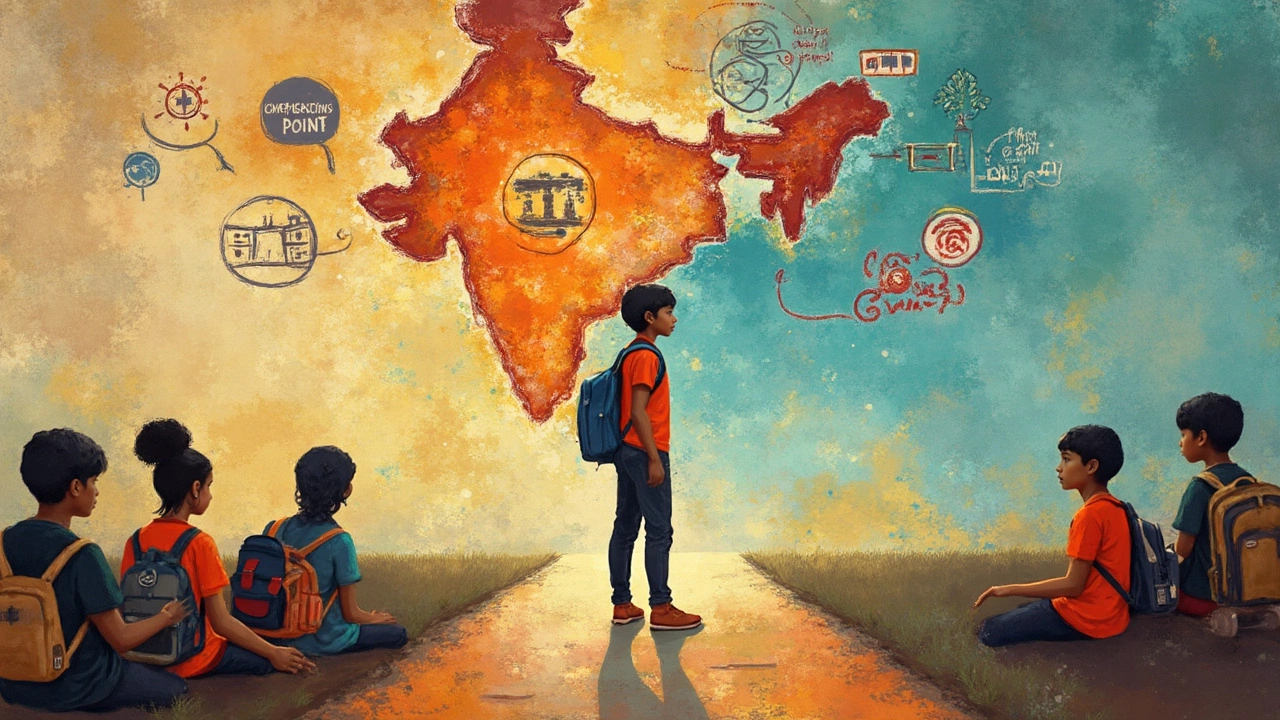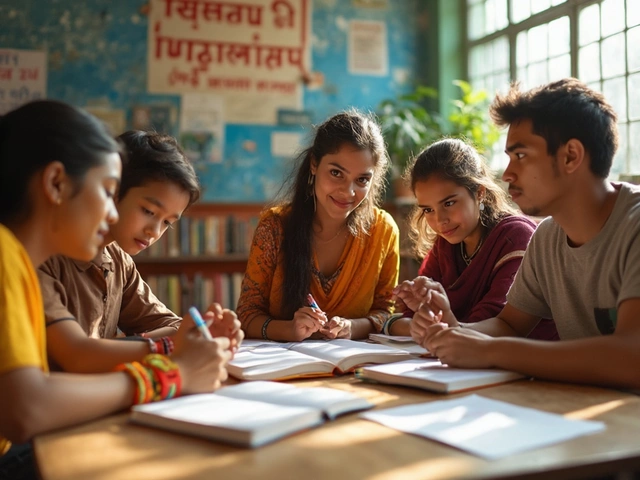
When it comes to picking a school board in India, it's more than just about the textbooks. Seriously, the decision can shape a kid's entire educational journey and even their future job prospects. One of the big players here is the Central Board of Secondary Education, or CBSE as most folks know it. This board isn't just popular across the country; it's a name that resonates with quality education and rigorous academics.
Many parents and students often find themselves in a dilemma: should they stick with a state board or lean towards something like CBSE? Well, CBSE's curriculum is designed with competitive exams in mind, like the IIT entrance or NEET, which is a huge plus if your kid has aspirations for such fields. Plus, its alignment with international educational standards only sweetens the deal for those considering studies abroad.
- Understanding CBSE's Role
- Comparing State and National Boards
- How CBSE Prepares for Competitive Exams
- CBSE and International Recognition
- Flexibility in Subject Choices
- Parental and Student Perspectives
Understanding CBSE's Role
The Central Board of Secondary Education, or CBSE, is more than a school board; it’s a hallmark of structured and consistent education across India. Established originally to support the educational needs of students whose parents were getting transferred across states, CBSE provides a uniform framework that levels the playing field for students from all backgrounds.
CBSE is particularly known for its robust curriculum that covers a broad spectrum of subjects. The syllabus aligns closely with key competitive exams such as JEE (Joint Entrance Examination) for engineering and NEET (National Eligibility Cum Entrance Test) for medical studies. This makes CBSE a popular choice among students aiming for prestigious careers.
One of the board's major contributions is its continuous and comprehensive evaluation system, introduced to reduce the stress of final exams. This approach ensures that students aren't just memorizing facts but actually understanding concepts. It's all about applying what you learn to real-world problems, which is something CBSE stresses. Schools affiliated with CBSE often provide ample opportunities for students to engage in sports, arts, and other co-curricular activities, nurturing an all-rounded development.
CBSE’s role isn’t limited to just academics. It also sets a standard for quality education that many schools aspire to meet. By regularly updating its curriculum and incorporating modern educational strategies, CBSE makes sure it remains relevant and effective. Fun fact: As of 2023, CBSE had over 25,000 schools affiliated with it both in India and abroad, underscoring its global reach and influence.
| Year | Number of CBSE Schools |
|---|---|
| 2015 | 18,000 |
| 2023 | 25,000 |
At its core, CBSE aims to provide students with quality education and equip them with the skills needed to thrive in a competitive world. Its emphasis on holistic development makes it a preferred choice for many families, ensuring their children are prepared not just academically, but socially and culturally as well.
Comparing State and National Boards
Alright, so you're trying to figure out the difference between state and national boards in India. It's a decision that can honestly make or break a student's educational experience. Let's break down the basics.
First off, the CBSE board is a national board, which means its curriculum is uniform across all its schools throughout India. This consistency is a massive advantage for families who might move between states due to work. You'll find the same syllabus and exam pattern whether you're in Delhi or Chennai.
On the flip side, state boards vary from one state to another—they're designed to cater to regional advancements and specifics. This can be great if you're looking to focus on your state's history and culture, but it can also mean differences in quality and rigor.
Now, here's where it gets interesting. CBSE shines when it comes to preparing students for national-level competitive exams. It's got that edge because its syllabus is often aligned with entrance exams, making it a preferred choice for fields like engineering and medical sciences.
In terms of numbers,
| School Board | Approximate Schools | Focus |
|---|---|---|
| CBSE | Over 21,000 globally | Competitive exams, standardization |
| State Boards | Varies by state, thousands within each | Regional focus, local history and culture |
Lastly, let's talk about recognition. A CBSE certificate is often seen in higher regard internationally, thanks to its widespread acceptance. So if there's a chance your child might study abroad later, it's something to think about.
At the end of the day, both options have their pros and cons. It all boils down to your priorities—be it mobility, focus on regional content, or preparation for those hard-hitting competitive exams.
How CBSE Prepares for Competitive Exams
When thinking about competitive exams in India, the CBSE is top of mind for many students. It's not just the vast reach of this board, but the deliberate alignment of its syllabus with competitive exams that gives it an edge.
Firstly, the CBSE syllabus is structured to cover a lot of the material featured in entrance exams like JEE, NEET, and others. So, students follow a curriculum that’s in sync with what they’ll face later on. This overlap minimizes the 'extra study' you might need when gearing up for these exams.
The board also emphasizes conceptual clarity. Instead of just rote learning, students are encouraged to really understand topics. This approach—detailed guides, project work, and plenty of real-world examples—makes tackling problem-based questions much easier on test day.
Another cool thing about CBSE is its focus on continuous assessment. Regular exams and assignments help track a student's progress, identify weak areas, and implement improvements long before they sit for those big exams.
For those visually inclined, here’s a little nugget of info:
| Exam Component | CBSE Coverage |
|---|---|
| Theory | Broad but balanced, often includes practice questions similar to entrance exams. |
| Projects | Encourages application of concepts, crucial for exams focusing on real-world applications. |
| Practicals | Hands-on learning, prepares for lab and field questions in science-based papers. |
By offering structured guidance and resources, CBSE not only gets students exam-ready but also nurtures deeper learning. Whether it’s math, science, or humanities, the board's approach helps tune young minds for the challenging pathways that lie ahead.

CBSE and International Recognition
So you've probably heard that the CBSE board isn't just popular in India—it's got a bit of a global rep, too. This isn't by accident. The CBSE board is known for its structured syllabus, which aligns well with international education standards. Schools worldwide are catching on to this trend, thanks to CBSE's straightforward yet comprehensive approach to education.
One cool thing about CBSE is its collaboration with the Council for the Indian School Certificate Examinations and international bodies to align its curriculum. This means if you're thinking about sending your kid abroad for higher studies, having a CBSE certification could give them a leg up. Numerous international universities, especially in places like the UK and USA, recognize CBSE scores, making it easier for students to get those acceptance letters.
But it's not just about the universities. CBSE's evaluation system also gets points for fairness and thoroughness, ensuring that students truly earn their marks rather than just cramming for exams. This aspect often sparks confidence among foreign institutions looking for students who are well-prepared and knowledgeable.
Let's take a quick look at some numbers to put things into perspective:
| Country | Number of CBSE-Affiliated Schools |
|---|---|
| USA | 50 |
| UAE | 80 |
| UK | 20 |
These figures highlight CBSE's growing popularity and its role as a key player in international education. If you're a parent considering global education for your child, opting for a board that's recognized on such a broad scale might just make a lot of sense.
Flexibility in Subject Choices
One of the biggest perks of the CBSE system is the flexibility it offers when it comes to picking subjects. Unlike some boards that make you stick to a rigid set of choices, CBSE lets students mix and match according to their interests and career plans. Want to study physics and economics together? Totally doable!
This flexibility is not just about personal preference; it's a huge asset for students looking to explore multiple fields. For instance, a kid interested in both math and art can keep their options open without compromising on either side. This allows students to grow with a well-rounded education, giving them an edge in today's multidisciplinary world.
Moreover, this freedom is crucial for competitive exams too. Imagine you're targeting engineering but still want to learn a bit of business studies. CBSE's structure makes this possible, preparing you for different academic paths.
CBSE also offers vocational subjects, which can be super helpful if you're looking to gain specific skills while you're still in school. Whether it's information technology or fashion studies, the range of courses available is wide.
Here's a quick snapshot of the subject choice options:
- Science stream: Options like Physics, Chemistry, and Biology.
- Commerce stream: Choose among subjects like Accountancy and Business Studies.
- Humanities: Explore areas like History, Political Science, and Sociology.
- Vocational Courses: From IT to Creative Writing, there's a lot to explore.
The flexibility in the CBSE board is a game-changer for many students, helping them to tailor their education according to their future goals. This freedom doesn't just make learning more enjoyable, but also aligns with real-world skills and job markets, making CBSE a compelling choice for many.
Parental and Student Perspectives
When it comes to choosing a school board like CBSE, parents and students have a lot to weigh in. From a parent's point of view, what's often top of mind is the future. Many parents believe that a good education isn't just about passing exams—it's about setting the stage for life. They see CBSE as the board that offers not only the know-how needed for those dreaded competitive exams but also critical thinking skills that go beyond rote learning.
Parents appreciate the way CBSE integrates holistic development through activities and projects, which are part of its continuous and comprehensive evaluation. This means kids aren’t just book-smart but learn to tackle real-world challenges too. Another thing that draws parents in is the fact that CBSE schools are everywhere. So, even if they have to relocate, there's a good chance they'll find a CBSE school nearby, keeping the transition smooth for the kids.
For students, the picture is a bit different but just as positive. Many kids feel that CBSE gives them a strong foundation, especially in subjects like math and science, which helps if they plan to pursue engineering or medicine. The syllabus is updated frequently, so they're learning things that are current and relevant. Plus, the mix of objective and subjective testing means they get to show off what they know and figure things out on the fly.
Check out this quick glance at what students and parents have to say:
- Emphasis on core subjects like science and mathematics
- Frequent curriculum updates to stay relevant
- Extensive network allowing easy transition during family relocations
In all, both parents and students seem to agree on one thing: CBSE brings a lot of value to the table, making it a top choice for families across India.





